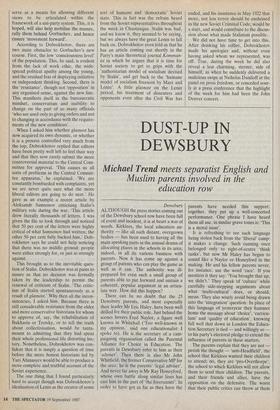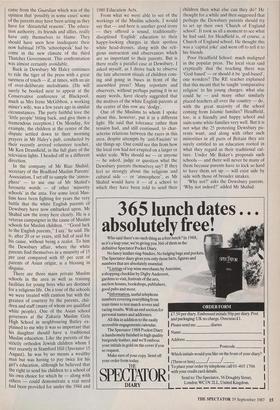DUST-UP IN DEWSBURY
Michael Trend meets separatist English and
Muslim parents involved in the education row
Dewsbury ALTHOUGH the press stories coming out of the Dewsbury school row have been full of event and incident, it is at heart a war of words. Kirklees, the local education au- thority — like all such distant, overgrown bodies — has been used to having all the main speaking parts in the annual drama of allocating places in the schools in its area; indeed, in all its various business with parents. Now it has come up against a group of parents who can play the game as well as it can. The authority was ill- prepared for even such a small group of parents able to put forward and sustain a coherent, popular argument in an articu- late way. How did this happen?
There can be no doubt that the 25 Dewsbury parents, and most especially their leader Mr Eric Haley, have been well drilled for their public role. Just behind the scenes hovers Fred Naylor, a figure well known in Whitehall (`Too well-known in my opinion,' said one educationalist I spoke to). He is the secretary of a cam- paigning organisation called the Parental Alliance for Choice in Education. The parents in Dewsbury refer to him as their 'adviser'. Then there is also Mr John Whitfield, the former Conservative MP for the area: he is the parents 'legal adviser'. And never far away is Mr Ray Honeyford, whose own battle along similar lines has cast him in the part of 'the forerunner'. In order to have got as far as they have the parents have needed this support: together, they put up a well-concerted performance. One phrase I have heard them all use, in similar grave tones is: 'This is a moral issue'.
It is refreshing to see such language being stolen back from the 'liberal' camp: it makes a change. Such cunning once belonged only to right-of-centre 'think tanks', but now Mr Haley has begun to sound like a Naylor or Honeyford in the making. He and his fellow parents never, for instance, use the word 'race'. If you mention it they say: 'You brought that up, we didn't.' They speak of 'culture' while carefully side-stepping arguments about what 'multi-cultural' does, or should, mean. They also wisely avoid being drawn into the 'integration' question. In place of this language of yesteryear they hammer home the message about 'choice', 'curricu- lum' and 'quality of education', knowing full well that down in London the Educa- tion Secretary is tied — and willingly so to his party's electoral pledge to extend the influence of parents in these matters.
The parents explain that they are not perish the thought — 'anti-Headfield', the school that Kirklees wanted their children to attend; no, they are 'pro-Overthorpe', the school to which Kirklees will not allow them to send their children. The parents, and their friends and allies, have the opposition on the defensive. The worst that their public critics can throw at them came from the Guardian which was of the opinion that 'possibly in some cases' some of the parents may have been acting as they have for 'distasteful reasons'. The educa- tion authority, its friends and allies, really have only themselves to blame. They should have seen how inadequate their now habitual 1970s `schoolspeak' had be- come in the new climate of the third Thatcher Government. This confrontation was almost certainly avoidable.
Back in Dewsbury Mr Haley continues to ride the tiger of the press with a great sureness of touch — if, at times, with an air of over-deliberate melodrama. (He will surely be booked next to appear at the Conservative conference at Blackpool, much as Mrs Irene McGibbon, a working miner's wife, was a few years ago in similar circumstances. The party faithful love the `little people' biting back, and give them a tremendous reception.) On Monday, for example, the children at the centre of the dispute settled down to their morning prayers in Mr Haley's pub, conducted by their recently arrived volunteer teacher, Mr Ken Dransfield, in the full glare of the television lights. I headed off in a different direction.
In the company of Mr Riaz Shahid, secretary of the Bradford Muslim Parents' Association, 1 set off to sample the 'atmos- phere' — to use one of Mr Shahid's favourite words — of other 'minority schools' in the area. For some local Mus- lims have been fighting for years the very battle that the white English parents of Dewsbury have now embarked upon. Mr Shahid saw the irony here clearly. He is a veteran campaigner in the cause of Muslim schools for Muslim children. "Good luck to the English parents," I say,' he said. He is, after 20 or so years, still full of zeal for his cause, without being a zealot. To him the Dewsbury affair, where the white parents find themselves in a minority of 15 per cent compared with 85 per cent of parents of Asian origin, is a blessing in disguise.
There are three main private Muslim schools in the area as well as training facilities for young boys who are destined for a religious life. On a tour of the schools we were treated with caution but with the greatest of courtesy by the parents, chil- dren and staff (many of whom are qualified white people). One of the Asian school governors at the Zakaria Muslim Girls High School in neighbouring Batley ex- plained to me why it was so important that his daughter should have a traditional Muslim education. Like the parents of the strictly orthodox Jewish children whom I met recently in Stamford Hill (Spectator 15 August), he was by no means a wealthy man but was having to pay twice for his girl's education, although he believed that the right to send his children to a school of his own choice for which he — along with others — could demonstrate a real need had been provided for under the 1944 and
1980 Education Acts.
From what we were able to see of the workings of the Muslim schools, I would say that — and here is another good irony — they offered a sound, traditionally- disciplined 'English' education to their happy-looking charges in their spotless white head-dresses, along with the reli- gious instruction and observances which are so important to their parents. But is there really a parallel case at Dewsbury, I asked myself, as I drove back to observe the late afternoon rituals of children com- ing and going in buses in front of the assembled press? Many reporters and observers, without perhaps putting it in so many words, have clearly suggested that the motives of the white English parents at the centre of this row are 'dodgy'.
One of the Muslims to whom I spoke about this, however, put it in a different light. He said that tolerance rather than tension had, and still continued, to char- acterise relations between the races in this area, despite attempts by 'anti-Fascists' to stir things up. One could see this from how the local row had not erupted on a larger or wider scale. Why should we — or anyone — he asked, judge or question what the Dewsbury parents themselves say? If they feel so strongly about the religious and cultural side — or 'atmosphere', as Mr Shahid would have it — of a school to which they have been told to send their children then what else can they do? He thought for a while and then suggested that perhaps the Dewsbury parents should try to set up their own 'Church of England school'. It took us all a moment to see what he had said, for Headfield is, of course, a Church of England school. He thought this was a 'capital joke' and went off to tell it to his friends.
Poor Headfield School: much maligned in the popular press. The local vicar said cryptically that the teaching there was 'God-based' — or should it be 'god-based', one wonders? The RE teacher explained that this meant that he taught 'comparative religion' to his young charges: what else could he — and many other similarly placed teachers all over the country — do, with the great majority of the school coming from Islamic families? Headfield, too, is a friendly and happy school and suits some white families very well. But it is not what the 25 protesting Dewsbury pa- rents want, and along with other such minorities in all parts of Britain they are surely entitled to an education rooted in what they regard as their traditional cul- ture. Under Mr Baker's proposals such schools — and there will never be many of them because parents have to kick so hard to have them set up — will exist side by side with those of broader intakes.
`Why not?' asks the Dewsbury parents. 'Why not indeed?' added Mr Shahid.



































































 Previous page
Previous page